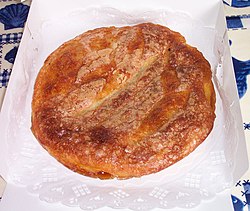Kouign-amann (/ˌkwiːn æˈmɑːn/; Breton: [ˌkwiɲ aˈmãn]; pl. kouignoù-amann) is a sweet, round Breton laminated dough pastry, originally made with bread dough (nowadays sometimes viennoiserie dough), containing layers of butter and incorporated sugar, similar in fashion to puff pastry albeit with fewer layers. It is slowly baked until the sugar caramelizes and the butter (in fact the steam from the water in the butter) expands the dough, resulting in its layered structure. A smaller version, kouignette, is similar to a muffin-shaped, caramelized croissant.
 Kouign amann pastry | |
| Type | Bread |
|---|---|
| Place of origin | France |
| Region or state | Brittany |
| Main ingredients | Yeast-leavened dough, butter, sugar |
A specialty of the town of Douarnenez in Finistère, Brittany where it originated around 1860, the pastry is attributed to Yves-René Scordia (1828–1878).[1] The name comes from the Breton language words for 'bread' (kouign) and 'butter' (amann), and in 2011 the New York Times described the kouign-amann as "the fattiest pastry in all of Europe."[2]
Recipe
editThe strict original Douarnenez recipe requires a ratio of 40 percent bread dough, 30 percent butter, and 30 percent sugar.[3] Traditionally, kouign-amann is baked as a large cake and served in slices, although recently, especially in North America, individual cupcake-sized pastries (kouignettes) have become more popular.[citation needed]
Popularity
editThe kouign-amann has been a staple pastry at many Japanese bakeries after becoming popular in the late 1990s.[4][5]
In 2014 episode 7 of series 5 of the BBC's The Great British Bake Off[6] featured the kouign-amann. In 2015, notable bakeries in New York City,[7] Washington D.C.,[3] Boston,[8] Salt Lake City,[9] and San Francisco began to sell the pastry.[10][11][12] In Denver, several bakeries offer varieties; some shorten the name to "queen".[13]
As of 2024, the Kouign-amann had gained popularity in countries such as Indonesia, via Starbucks.
See also
editReferences
edit- ^ Gunther, Caitlin Raux (17 October 2019). "The Story of France's Most Extraordinary Pastry". Food52.com. Retrieved 2019-12-29.
- ^ Spiegel, Brendan (29 November 2011). "A Pastry From Brittany Making Waves Stateside". In Transit Blog. Retrieved 2018-10-14.
- ^ a b Krystal, Becky. "Meet the kouign-amann, the caramelized French pastry we're loving right now". Washington Post. Retrieved 2015-08-21.
- ^ ブーム再燃の噂!?フランス生まれの洋菓子「クイニーアマン」とは? (in Japanese). 6 March 2014.
- ^ "クイニーアマンとは?名前の意味や歴史は?作り方やアレンジレシピのおすすめも紹介!". chisou-media.jp (in Japanese).
- ^ "Episode 7: Pastries | The Great British Baking Show". Pbs.org. February 1, 2015.
- ^ "Better Than a Cronut: How to Master Kouign-Amann". Eater. Feb 27, 2015. Retrieved 2015-08-21.
- ^ Zwirn, Lisa (30 June 2015). "A 150-year-old pastry no one ever heard of - The Boston Globe". The Boston Globe. Retrieved 2015-08-21.
- ^ "The Neelys on Kouing Amann". Best Things I Ever Ate: Kouing-amann. Food Network. Retrieved 10 June 2019.
- ^ Irwin, Heather (9 July 2015). "BiteClub: Meet the new cronut, the Kouign Amann". The Press Democrat. Retrieved 2015-08-21.
- ^ Lucchesi, Paolo (19 June 2015). "B. Patisserie will be full of kouign amann on Saturday". Inside Scoop SF. San Francisco Chronicle. Retrieved 2015-08-21.
- ^ Alburger, Carolyn (October 3, 2011). "Croissant, Dethroned; All Hail Kouign-Amann | 7x7". 7x7.com. Retrieved 2015-08-22.
Now San Franciscans can find the rare treat at several cafes around town, and Wood has had to put a hold on new accounts because his little bakery can't keep up with the demand. So what the heck is kouign-amann, you ask? Let's start by saying your morning croissant is about to get upstaged in the pastry case.
- ^ Antonation, Mark (December 28, 2016). "Five Mini-Trends That Brought Big Flavors to Denver Menus in 2016". Westword.
External links
edit- Kouign amann: Some history (in French)
- Recipe for kouign-amann: An easy recipe on how to make kouign-amanns at home